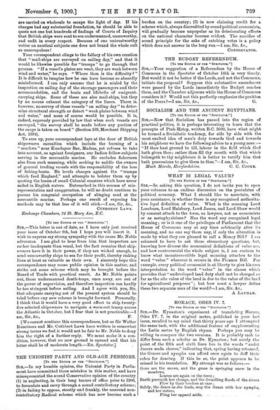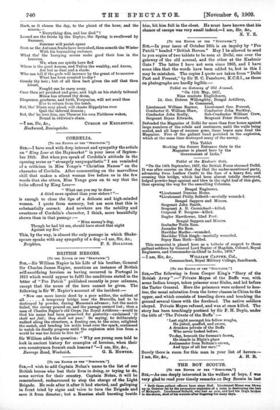HORACE, ODES IV. 7.
[To THE EDITOR OF THE " SPECTATOR:]
Stn,—Dr. Kynaston's experiment of translating Horace, Odes IV. 7, in the original metre, published in your last issue, recalled to my mind that thirty years ago I attempted the same task, with the additional feature of supplementing the Latin metre by English rhyme. Perhaps you may be willing to compare the two versions. It is probably rash to differ from such a scholar as Dr. Kynaston ; but surely the
point of the fifth and sixth lines lies in the words " audet ducere nuda choros," indicating that, spring having returned; the Graces-and nymphs can afford once again to doff their robes for dancing. If this be so, the point appears to be missed in his translation. My attempt was as follows :—
Gone are the snows, and the grass is springing anew in the meadows, Leaves are again on the trees ; Earth pursueth her change, and the dwindling, floods of the rivers Flow by their borders at ease ; Safely, the dance as she leads, may the Grace with her nymphs, and her sisters, Fling her apparel aside._
Hark, as it chases the day, to the plaint of the hour, and the season,— " Everything dies, and has died " ! Loosed are the frosts by the Zephyr, the Spring is swallowed by Summer, Summer will perish apace Soon as the Autumn fruits have been shed, then cometh the Winter With his benumbing embrace.
What tho' the hurrying moons make good their loss in the
heavens, We, when our spirits have lied Where is the good Aeneas, and Tullus the wealthy, and Ancus, Are but as dust and a shade.
Who can tell if the gods will increase by the grant of to-morrow What has been counted to-day?
Greedy thy heir ; but of all thou bast given the self that thou lovest, Nought can he carry away. Once thou art perished and gone, and high on his stately tribunal Minos has uttered thy doom, Eloquence, goodness, and birth, Torquatus, will not avail thee
E'er to return from the tomb.
Not,-tho' Diana may plead, will chaste Hippolytus ever
Quit the infernal domain ;
Not, tho' he love him, can Theseus his own Pirithous waken, Bound in oblivion's chain.
Hack wood, Basingstoke.































































 Previous page
Previous page